
About half of New Zealanders surveyed for EY’s Future Consumer Index said they refuse to buy products from companies unless they have a sustainable business model. Today’s consumers want eco-friendly products and increasingly support brands that do more to protect the planet.
Thankfully, the business world is responding. Corporates from around the world recognise that sustainability is no longer optional, and that has created big changes to the way products are being produced, packaged and distributed.
Due to the changing perspectives, it is becoming more critical for companies to address the gap between knowing and doing when it comes to embracing sustainable business practices. A corporate strategy with a sustainability focus can add brand value, meet consumer demands, increase efficiency, and attract valuable talent. For these reasons, many businesses are looking at a transition to a circular economy model.
What is a circular economy?
What goes around comes around, and that’s certainly true in a circular economy. Ōhanga āmiomio, or a circular economy, is a closed-loop system where materials never become waste and nature is regenerated. The concept at the heart of a circular economy is to 'ensure we can unmake everything we make'. This means that products, materials and resources are continuously reused, refurbished, remanufactured, and recycled with a focus on zero waste.
A circular economy is built on these principles:
- Eliminate waste and pollution
- Circulate products and materials
- Regenerate nature
In the linear throw-away culture that’s been the norm for so long, few consumers have cared much about understanding where things came from and where they go. But if we would continue this way, it could lead to "a total breakdown of Earth’s life support systems, which are already at a breaking point", according to The Circularity Gap Report, published in February 2023.
A move towards a circular economy offers a viable solution. Research by the Ellen Macarthur Foundation in collaboration with Material Economics suggests that creating a circular economy for five key sectors (cement, aluminium, steel, plastics and food) could cut CO2 emissions by 3.7 billion tons in 2050. That’s about the same as eliminating current emissions from all forms of transport world-wide!
MyNoke's contribution to a circular economy
Everyone will agree that sustainably managing organic waste makes a lot more sense than simply dumping it all at the landfill. MyNoke works with a range of organisations, including manufacturing plants, councils, dairy companies and pulp mills to provide an environmentally friendly organic waste solution.
MyNoke operates the world’s largest earthworm farms, and our vermicomposting technology diverts huge volumes of organic waste from landfills. It’s been quite a journey since 2007, when the company was founded with just 20 buckets of compost worms. In 17 years, MyNoke has processed more than 1.4 million tonnes of organic waste which has resulted in approximately 80% less greenhouse gas emissions when compared to landfill disposal.
Currently, MyNoke operates at three locations, in Tokoroa, Taupō and Ohakune. The worms reduce the waste volume by around 66%, producing a stable and sanatised soil conditioner – which is a huge benefit to the regions where the sites are operational. The circular cycle is completed as vermicast returned to cropping, farm and orchard land provides nutrients and supports the growth of crops, produce and livestock.

MyNoke's philosophy: Soil to Soil
The word vermicast may not have a classy ring to it, and worm castings doesn’t sound much better, but that doesn’t take away from the fact that MyNoke’s vermicast is a sought-after and cost-effective solution for soil health, plant growth, and better yields.
As 4 billion hungry earthworms eat their way through a mix of organic waste and digest it, what comes out at the other end has been naturally processed into a beneficial natural product that is distributed to farms, orchards and gardens.
Vermicast is an environmentally friendly, all-natural product that can be applied to farmland, used in agriculture, horticulture, viticulture and nurseries. It is one of the best additives for enhancing the ability of soil to cope with drought, fight pests and disease, and improve plant growth and general plant health.
Many New Zealanders are already enjoying the benefits of MyNoke earthworm products for their agri-businesses and gardens, and that interest is growing fast. The MyNoke team is excited about offering this end-to-end solution and, in their way, contribute to the circular economy. Working towards an organic waste-free New Zealand is what gets them out of bed in the morning.
With the global population predicted to approach 9 billion people by 2030, we are collectively using more resources than our planet can provide. Only when people and businesses move away from a take-make-waste economy and focus on being circular instead, nature will have the room it needs to heal and thrive.
To find out more about how you can work with MyNoke to foster a more circular future contact the team on info@mynoke.co.nz or call 0800 MYNOKE.
